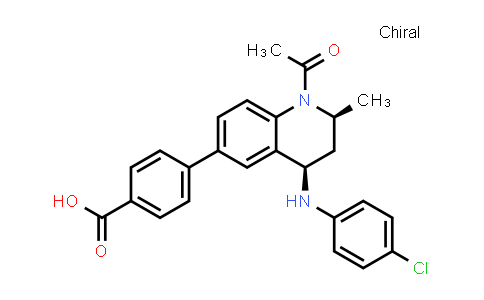
GSK1324726A NLT 98%
SKU : MC516684
CAS Number : 1300031-52-0
Molecular Formula : C25H23ClN2O3 | Molecular Weight : 434.91
Synonyms : I-BET726
Quote Request| Purity | NLT 98% |
|---|---|
| Storage | at 20ºC 2 years |
* The above information is for reference only.
* If the product has intellectual property rights, a license granted is must or contact us.
| Chemical Name | GSK1324726A |
|---|---|
| CAS Number | 1300031-52-0 |
| Molecular Formula | C25H23ClN2O3 |
| Molecular Weight | 434.91 |
| Synonyms | I-BET726 |
GSK1324726A is a novel, potent, and selective inhibitor of BET proteins with high affinity to BRD2 (IC50=41 nM), BRD3 (IC50=31 nM), and BRD4 (IC50=22 nM). IC50 & Target: IC50: 22 nM (BRD4), 31 nM (BRD3), 41 nM (BRD2)[1] In Vitro: A panel of neuroblastoma cell lines are treated with GSK1324726A (I-BET726), and observed potent growth inhibition and cytotoxicity in most cell lines irrespective of MYCN copy number or expression level. All neuroblastoma cell lines tested exhibit potent growth inhibition, with a median growth IC50 value (gIC50; inhibitor concentration resulting in 50% growth inhibition) equal to 75 nM[1]. In Vivo: GSK1324726A (I-BET726) inhibits neuroblastoma tumor growth. In the SK-N-AS model, mice in the vehicle group are euthanized on day 14 due to large tumor size. While there is no significant difference in tumor growth between the vehicle and GSK1324726A (5 mg/kg) group, 58% tumor growth inhibition (TGI) is observed in the GSK1324726A (15 mg/kg) group on day 14 of the study (n=9; p=0.006). Mice in the GSK1324726A (15 mg/kg) group are treated for an additional 7 days before tumor volume reaches a level comparable to that observed in the vehicle group, at which point the study is terminated. Tumors in the CHP-212 model grow much more slowly. After 42 days, tumors in vehicle-treated mice are only half the size those in the SK-N-AS model at the end of the study (Day 14). In the CHP-212 model, treatment with 5 mg/kg GSK1324726A results in TGI equal to 50% (n=8; p=0.1816), and mice in the 15 mg/kg group exhibits a TGI of 82% at the end of the study (n=5; p=0.0488)[1].
Related Products
© Copyright 2015-2024 Hangzhou MolCore BioPharmatech Co.,Ltd. All rights reserved.
